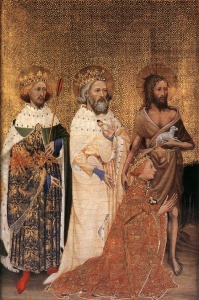I have always thought it the height of twattery to quote 17th-century Frenchmen, even more so than to quote Bernard of Clairvaux, or Cicero, or Abraham Lincoln. This is because 17th century Frenchmen can be accepted as so urbane, witty and glamorous – even Racine – that anyone who quotes them clearly thinks of themselves as such, and can therefore bugger off.
We do not need to know that La Rochefoucauld drew the distinction between thinkers and doers. It is for anyone to reason that it would be nice if, for example, government ministers took the advice of experts who actually know the field into which said minister has been parachuted, or if know-it-all theorists would practice what they preach. We are all heroes in our own imaginations. Marcus Aurelius observed as much. But aside from heralding the creeping grumpiness of a new term, what do these thoughts have to do with anything?
Today is the traditional Feast of Edward the Confessor, that’s what.
Edward occupies a strange place in the English historic imagination. He is an interim figure, someone poised between more interesting periods and dynamic characters. He is a patient, abstemious, possibly celibate man in a world of bastards and Vikings. We generally have no idea what a Confessor is, and it’s a saint who, rather than having a cinematic martyrdom, dies rather quietly. If he had lived today, he would probably collect stamps.
He was emphatically not a doer. Indeed, the most interesting thing he did, many would agree, was to die, because the most seismic shift in English social history closely followed his death. Certainly, Edward functioned as a patron saint for several centuries, but even in this he didn’t do anything, being already dead. (To give credit where it’s due, he also founded quite a nice abbey.)
#squadgoals
Part of the development in history teaching in the past half century or so has been to move away from the idea of history being strung together by a few heroes (usual military) who forced the rest of us into progress, and more towards history within a narrative of flux, deriving from wider social forces as much as the actions of an elite. The heroes are retained only to be picked apart. The problem with the reign of Edward the Confessor from this perspective is that it is dominated by a military and ecclesiastical elite. The problem with Edward the Confessor is that he appears to have taken a back seat on pretty much everything.
So in the absence of much action to judge, what impression might we have of Edward’s character? Clearly he was religious; the Pope is a Catholic. He seems not to have been particularly keen on patronising literary efforts, unlike his mother Emma. He married a member of the most powerful family in the country, and was effectively ruled by them thereafter. Does this make him weak, apathetic, or just quite zen?
My inclination would be to see Edward as a sort of vegan pacifist geography teacher, like Merlin in the third Shrek movie. Non-confrontational and not terribly interested in status. Keen on growing his own vegetables, like a latter-day Noggin the Nog. He probably had a repertoire of jokes that he never told but which amused him greatly in long meetings. He may have had a favourite song that he requested of every scop he met, and it was never as good as the first time he heard it but he still made admiring faces and gave several coins. He was perhaps embarrassed by his coin portrait, thinking it showy-off. He almost certainly apologised to every rock he stubbed his toe on. He was undoubtedly fond of his too-glamorous wife, and mildly saddened that she hated his favourite tunic. He definitely had a beard.
Edward the Confessor was Jeremy Corbyn. You heard it here first.

